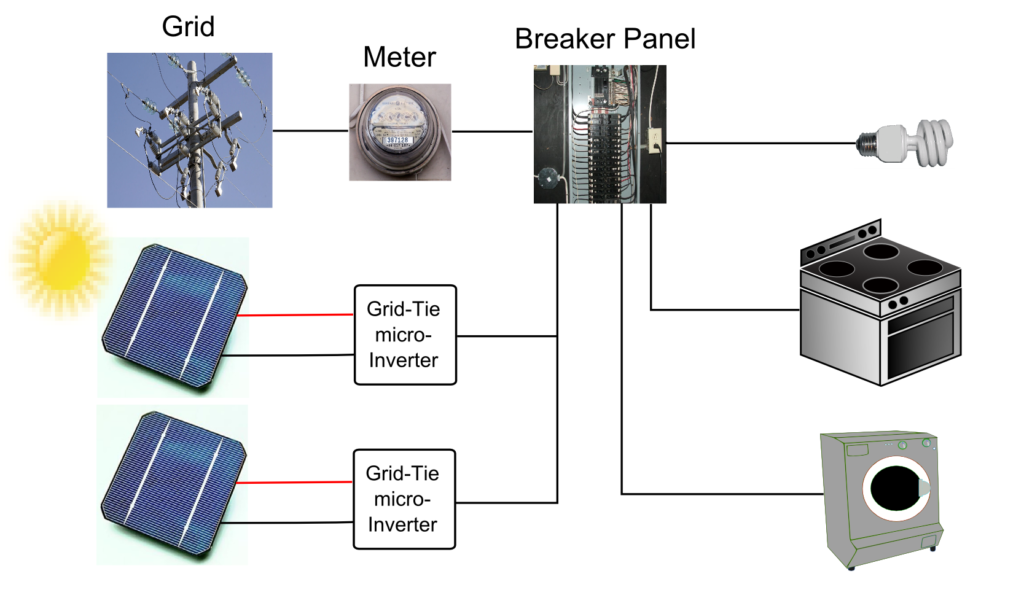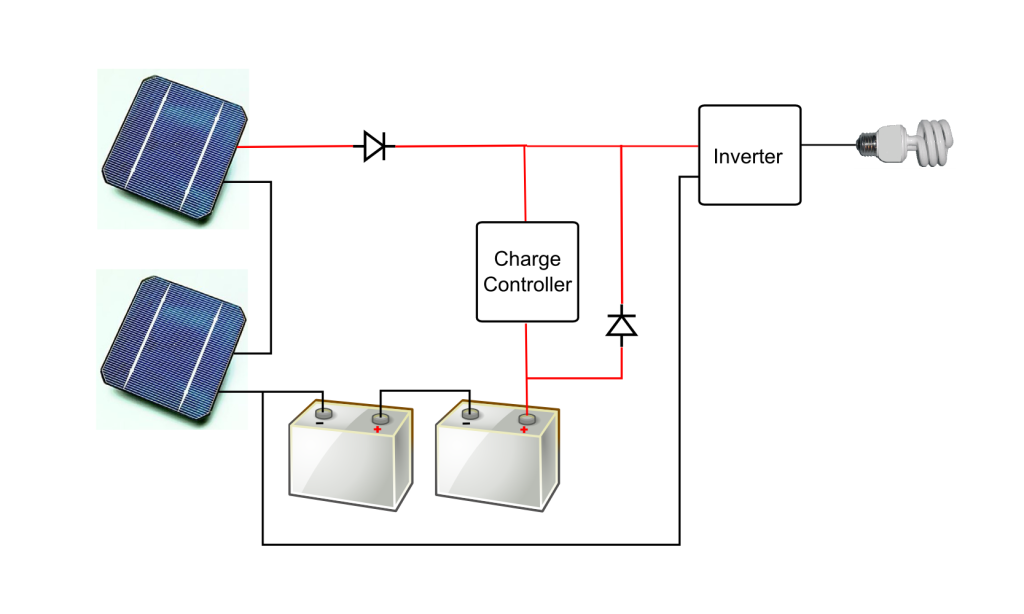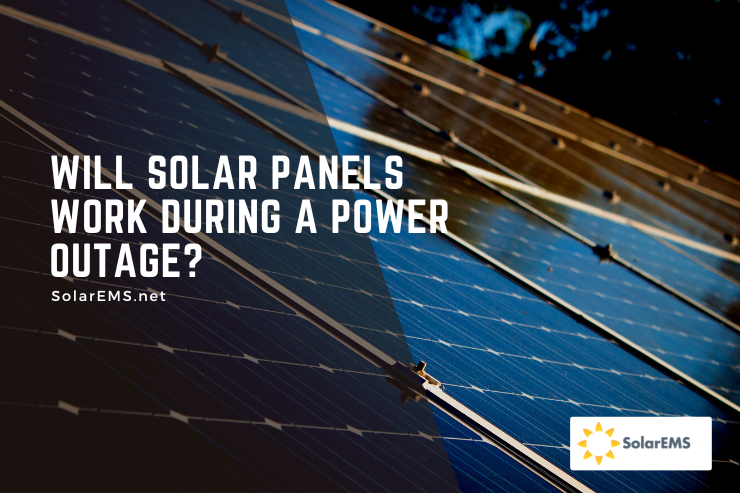Before installing a solar system in your house you might want to ask yourself ‘Will the solar panels work during a power outage?’ which is undoubtedly a valid question from a responsible customer. Well, the short answer to this question is no. Read on to know why solar panels won’t work during power outages.
Most people utilize a grid-connected solar system which means during night time they might use the electricity provided by the utility company. The solar systems have been manufactured in a way that when a power outage happens the system will shut down in order to restrict the advancement of electricity into the wires which are the origin of this outage. This way people can avoid getting into an accident during unforeseen circumstances.
Although it is true that you cannot use electricity during these conditions, you can certainly make use of the alternative methods of solar panels for power outages to ensure that your residence is receiving enough electricity during blackouts. In this article, we will discuss what happens to a home with a solar installation during power outages and what you can do to ensure that you are receiving uninterrupted electricity.
The reasons behind power outages
It is definitely true that power outages come with lots of inconveniences and create a lot of troubles in your daily lifestyle but have you tried to find out the reasons behind power outages?
Lightning is one of the most fundamental reasons behind power outages and it causes the most damage to the electrical grid.
Other than that, there are multiple weather-related events that can create huge problems for the electrical grid causing power outages such as heavy rainfall, snowfall, hurricane, tornado, etc. Blackouts also happen due to car accidents (if a car damages poles or power lines). Sometimes the utility company also conducts routine maintenance and during this time you will not receive any kind of power from the grid.
The above-mentioned causes can be considered man-made and natural causes behind blackouts. In case you are living in a region that is prone to natural disasters, hurricanes, etc. then you must have faced power outages for weeks or even months which is why you should rely on solar panels for power outages. It can help you receive a consistent power supply even during natural disasters.
Why solar panels don’t function during blackouts?

While installing solar panels homeowners mostly opt for grid-tied solar panels which suggest that the solar panels are linked with an inverter. This particular inverter is attached to the main AC panel of your residence and it also comes with a specially designed electric meter that evaluates the energy utilization of your residence through the utility company and the amount of electricity sent by your solar system to the grid.
Generally, grid-tied solar systems do not have any kind of battery attached to them which means the grid itself works as a battery for the house. For the excess energy produced and transferred by your solar system to the grid, you receive energy credits from the utility company. When the sunlight is unavailable your residence can consume electricity from the grid and at the end of the month your utility bill can balance out.
A grid-tied solar system comes with an automatic shut-off feature that functions well during power outages. With the help of this feature, the extra energy produced by your solar system does not get transferred to the grid, preventing any kind of damage to the power lines. It is essentially a safety feature designed to protect the line workers who are responsible for fixing the wiring system.
Due to this particular safety feature your residence will not receive energy and the solar power does not go anywhere unless you have a system in place to store the excess energy produced by the solar panels for power outages.
Why solar panels for power outages have become critical
Solar panels have proven to be an excellent solution for homeowners. Due to the increasing usage of solar panels, the global solar capacity amounted to 849 GW in 2021. According to NPR people are slowly losing faith in the current electricity system and are depending on solar energy to become independent.
Due to the increase in natural disasters, the old utility grid is falling apart and people are facing more and more power outages. In this condition, relying on solar panels for power outages has become a more viable solution for people.
How does the solar energy system work?
The entire solar energy system is powered by solar panels. The solar panels utilize the sun’s rays and produce direct current or DC electricity. The AC or alternate current is more popular among residences and offices which is why the DC current produced by the solar panels is then converted into AC current with the help of an inverter.
After the AC current has been converted successfully it can be used to power the appliances of your home and office. That is why if your neighborhood goes through power outages then you will not be able to use your solar system to power up your home.
Additionally, after a power outage incident, the utility repairmen will arrive in order to restore the line and at that time you will not be able to use your (grid-connected) solar system because it can be problematic and dangerous for the repairmen.
Ways to survive using solar power during blackouts
If you want to utilize electricity even after the blackout then you can opt for the methods mentioned below:
- Install a solar-powered generator
- Utilize a backup gas generator
- Put in place a special inverter system
- Use solar batteries with your solar system
Utilize a backup gas generator
If you are cost-conscious and want to sort things out quickly during power outages then the cheapest way to do so would be to purchase a backup power generator. By spending a maximum of $1500 you will be able to purchase and install a fuel-powered generator such as FIRMAN H08051 Dual Fuel Portable Generator, DuroMax XP10000E Gas Powered Portable Generator, that has a capacity of more than 9000 watts good enough for a normal residence. You can easily use this generator until the line workers have fixed the grid.
Although using a generator can be a viable option you should also consider the drawbacks of using a fuel generator. The disadvantages of using a fuel generator include bad smells, loud noise, air pollution, etc. Not to mention you will also have to spend money on purchasing fuel for the generator. Instead, you can certainly opt for solar-based options such as solar-powered generators, inverter systems, solar batteries, etc.
Put in place a special inverter system
Even though your grid connection is off during a blackout you can utilize the solar energy generated through your solar panels without using a battery. Companies like Enphase and SMA have introduced solar inverters in the market.
At the time of an outage, these solar inverters will detach your home’s electricity connection with the grid and continue to supply electricity to your home from the solar panels for power outages.
Install a solar-powered generator
Solar-powered generators are also an excellent option for households with solar systems. Renowned companies like Goal Zero, Renogy, etc. have introduced solar-powered generators in the market that can help you run your refrigerator, heater, etc. However, you also need to note these generators can be charged with or without the help of solar panels for power outages which is why it is an excellent option for people with solar systems in their homes.
Use solar batteries with your solar system
Installing solar batteries with your solar system will give your true peace of mind during power outages. Battery backup power can be seamlessly transitioned from grid to solar battery with a solar battery which is why it is the most useful and reliable option for people with grid-connected solar systems installed at their houses.
In terms of solar batteries, there are multiple options available depending on your budget. For example, you can use a Tesla Powerwall, or a deep cycle lead acid battery such as Renogy Deep Cycle AGM Battery 12 Volt 100Ah, Lithium Charger 58.4V 8A 500W for 48V Lifepo4 Deep Cycle Battery, etc. These batteries can easily power up your house during blackouts.
A significant advantage of using solar batteries over grid-tied solar systems is that the solar system can disconnect itself from the grid during blackouts and keep supplying electricity to your residence. The batteries will be charged during the day and discharged at night when the blackout remains in place. With enough battery capacity, you can keep your household running even during a long power outage.
Going off-grid is also a viable option

If you are an environmentally conscious person and want only clean energy to get through the wires of your residence then opting for an off-grid solar system is also an excellent choice. In this way, you won’t have to worry about blackouts even though your neighborhood is facing the same issues. However, you should think twice before going completely off-grid because it certainly is a costly option.
Apart from financial commitments, another aspect you need to consider about off-grid solar panels for power outages is that you will need to save energy for the seasons when the sunlight will be limited. During cold winter months or during the monsoon season you may not get enough sunlight for days or even weeks which is why you need to have enough battery backup.
The battery itself for off-grid solar panels for power outages can cost a lot of money apart from the other necessary hardware needed to complete the setup. For these reasons, you should think twice before installing an off-grid solar panel or else you may end up using a fuel generator during the monsoon and winter (due to power outages or insufficient electricity).
Final words
Power outages or blackouts can happen due to multiple reasons and if you already have a solar system installed then you should take precautions and utilize solar panels for power outages to ensure that you are receiving electricity even though you are not connected to the grid.
Moreover, by being self-reliant you can further contribute to the environment. Although going totally off-grid is a considerably expensive option you can certainly opt for the most cost-efficient alternatives such as solar generators, batteries, inverters, etc.
If you are installing solar panels at your house you should be ready for any given circumstances and the above-mentioned technologies can help you tackle a problem like power outages.
Frequently asked questions
What happens to my solar system if there is a power outage in my area?
During a power outage, the solar system (grid-connected) installed in your house will stop functioning because it has been manufactured and installed in such a way. The on-grid solar systems are programmed to turn off so that the excess power does not travel through the wire connected to the grid. In the case of an off-grid solar system, your solar system will continue to function as usual.
Do I need a generator if I have solar panels?
Solar panels do not have the ability to work as a backup store in case of a power outage and that is why during blackouts the solar system automatically turns off. If you want to enjoy an uninterrupted power supply even during blackouts then you will have to install a backup or generator or a solar battery with your solar system.
Do solar panels work on cloudy days?
Yes, the solar panel will still work if it receives reflected or partially blocked sunlight. Although you won’t be able to receive the maximum efficiency from the solar panels you can expect to receive a relatively less amount of energy from the solar panels.
How long do solar panels last?
On average, you can expect the solar panels to last for at least 25 to 30 years. If you are using tier-one solar panels then they may continue to last longer with proper cleaning and maintenance. However, if you are using tier two or tier three solar panels then you may have to change your solar panels after 25 years of use.
In this article, we have discussed all the possible reasons for power outages and what is the exact function of a solar system or solar panel during power outages. Furthermore, we have provided multiple ways you can continue to receive power supply during blackouts so that it does not interfere with your daily lifestyle.
Meet the Authors
Brantley Edison is a highly experienced and accomplished writer in the field of solar energy. With over a decade of experience in the renewable energy industry, Brantley has contributed significantly to the growth and adoption of solar energy across various sectors. He has worked on several large-scale solar projects, including the design and installation of solar energy systems for commercial and residential properties.
Brantley holds a Bachelor's degree in Electrical Engineering and a Master's degree in Sustainable Energy. His educational qualifications and hands-on experience have given him a deep understanding of the technical aspects of solar energy, and he is well-versed in the latest trends and advancements in the industry.
Brantley's writing is highly informative and engaging, with a focus on educating readers about the benefits of solar energy and promoting sustainable practices. His expertise and contributions to the solar energy industry make him a valuable resource for those interested in adopting solar energy solutions.

